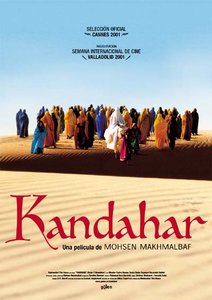Kandahar (2001 film)
| Kandahar | |
|---|---|
 |
|
| Directed by | Mohsen Makhmalbaf |
| Produced by | Mohsen Makhmalbaf |
| Written by | Mohsen Makhmalbaf |
| Starring |
Nelofer Pazira Sadou Teymouri Hoyatala Hakimi Dawud Salahuddin (Hassan Tantai) |
| Music by | Mohammad Reza Darvishi |
| Cinematography | Ebrahim Ghafori |
| Edited by | Mohsen Makhmalbaf |
| Distributed by | Avatar Films |
|
Release date
|
|
|
Running time
|
85 minutes |
| Country | Iran |
| Language |
Persian English Pashto Polish |
Kandahar (Dari-Persian: قندهار, "Qandahar") is a 2001 Iranian film directed by Mohsen Makhmalbaf, set in Afghanistan during the rule of the Taliban. Its original Persian title is Safar-e Ghandehar (سفر قندهار), which means "Journey to Kandahar", and it is alternatively known as The Sun Behind the Moon. The film is based on a partly true, partly fictionalized story of a successful Afghan-Canadian, played by Nelofer Pazira, who returns to Afghanistan after receiving a letter from Dyana, her life-long girl friend who was left behind when the family escaped, that she plans on committing suicide on the last solar eclipse of the millennium.
Kandahar was filmed mostly in Iran, including at the Niatak refugee camp, but also secretly in Afghanistan itself. Most people, including Nelofer Pazira, played themselves. The film premiered at the 2001 Cannes Film Festival, but did not get much attention at first. After 9/11, however, it was widely shown. Kandahar won Makhmalbaf the Federico Fellini Prize from UNESCO in 2001.
Hidden behind a burqa, Nafas, the sister from Canada, makes her way across the border with a family of refugees. When they are robbed by brigands and the family turns back, she decides to continue on her way, accompanied first by a young boy who was just expelled from a Qur'anic school, and then by an African American convert to Islam, who has become disillusioned with the turn the country has taken under the Taliban.
As the film proceeds, Nafas learns more and more about the hardships women face under the Taliban, and even more so, how years of war have destroyed Afghan society. Her African American guide, hidden behind a false beard, points out to her that the only technological progress allowed in the country is weaponry. As they wander the countryside, Nafas records her impressions into a portable tape recorder hidden beneath her veils. She sees children robbing corpses to survive, people fighting over artificial limbs that they might need in case they walk through a minefield, and doctors who examine female patients from behind a curtain with a hole in it.
...
Wikipedia
